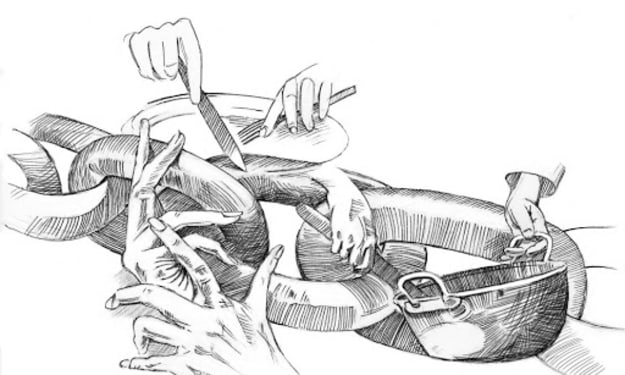Is Perpetuation Nonsense?. Part 2
The pointlessness of samsara questions, on the stupid things we seek.

It's not to mention the emanated creaking noise - another "loss-proof", for sound is as much an energy form. After all, a perpetual motion machine is, to any extent, futile, let alone the generation of any actual thermodynamic work.
(Were we even to create an ideal friction-isolated environment, the wheel could, at best, turn out a decoration instead of any fruitful outcome).
Before we could come up with any mechanical or thermodynamic law, our ancestors had pursued an "eternal engine" dream. To illustrate, human civilization did witness Bhaskara II's unbalanced mercury wheel of by 1100s, wherein mercury tubes had been expected to infinitely yield work, or Robert Boyle's' Boyle's Boyle's vase (further explanation below).
On the other hand, magnetic wheels' problem grounds in the attenuating and weakening properties of the magnetic attraction. Hmmm, what if we use a permanent magnet with a robust magnetism? We indeed have all too often heard of such a question, which exists as an Internet meme: does hanging a tenacious magnet in front of a metal vehicle move it forward?
This wide-eyed concept does hard work. The Third Newton Rule has it that when the magnet exerts a pull force forward, the car, in turn, uses an equivalent effect in the opposite direction on the attraction. Forasmuch as the system is coeval "pulled" in two different directions as the two objects are "hard-wired" to each other, which eventually cancels them out. The car, thus, remains stationary. To make it simple, try grabbing your collar and lifting yourself off the ground.
Given the advent of Newtonian theories of thermodynamics and mechanics, people strived to hunt down this fantastic engine. It wasn't' t until the 2000s,
Given the doomed-to-miserably-fail perpetual motion machine, accepting that it's no-way has, on the other hand, yielded good results. Consequently, Simon Stevin came up with the law of equilibrium on an inclined plane by the 1500s.
Johann Bessler's the miraculous Orffyreus wheel was ill-fated as Peter the Great died before his "cutting-edge" invention could ever get sold.
Are we doomed, since the perpetual motion secret was buried with him?
By November 1727, Johann's' sJohann's's sJohann’s's servant claimed that she was the one to have turned the wheel from the adjacent room. She was even assisted by the watchmaker's wife, brother and this prudent gentleman. In the end, the magic wheel turned out nothing less of a hoax.
That said, what if the universe has been operated on a different principle?
What if we came up with the perpetual motion machine? Is it praiseworthy?
To put into perspective, this universe is destructive, wherein humans drops in the ocean, have been too trivial to feel it coming. A universe's blink can last as long as from the very moment the Earth was formed to when it eventually "bites the dust".
In that Brobdingnagian blink, we humans struggle to build sandcastles and cease to exist on this tiny planet.
This nonsense, however, is what gives our lives some purposes.
To all appearances, the human civilization would be tedious, as we surrounded by perpetual machines.
We're born to strive and thrive, for we know well that what we're pursuing might halt tomorrow, the day after tomorrow or some other days in the future.
Thereupon, another door would open - which would close as early.
We embark on something to grapple one problem, and other things to fight other graver problems. They keep popping up, even while we're already struggling against previous issues.
The civilization has feasted on this. So have our minds.
What if what we've created never come to an end?
In all likelihood, our best inventions would become junks, for everything is then off the table.
About the Creator
olivia janell
You must stay drunk on writing so reality cannot destroy you.






Comments
There are no comments for this story
Be the first to respond and start the conversation.